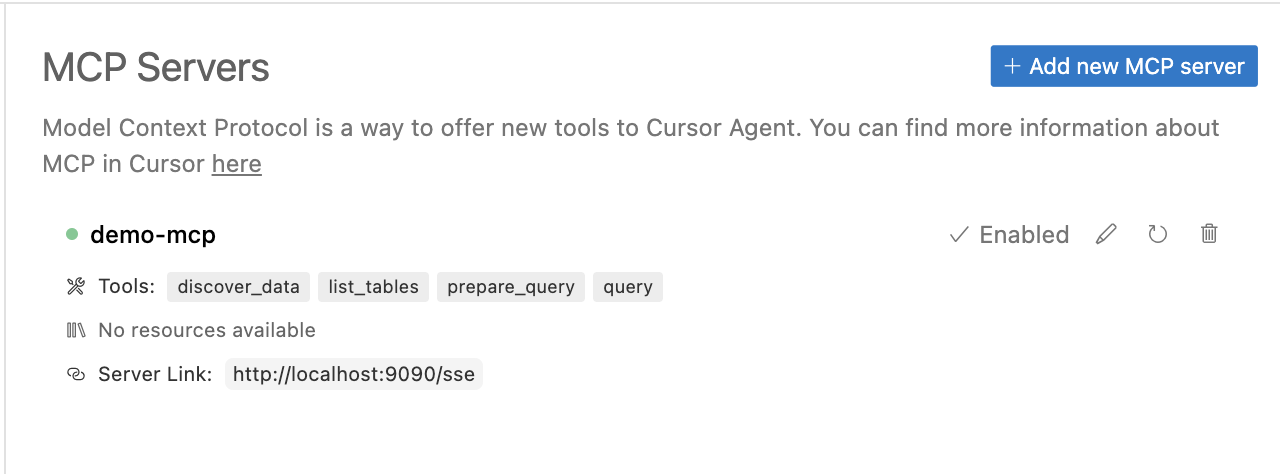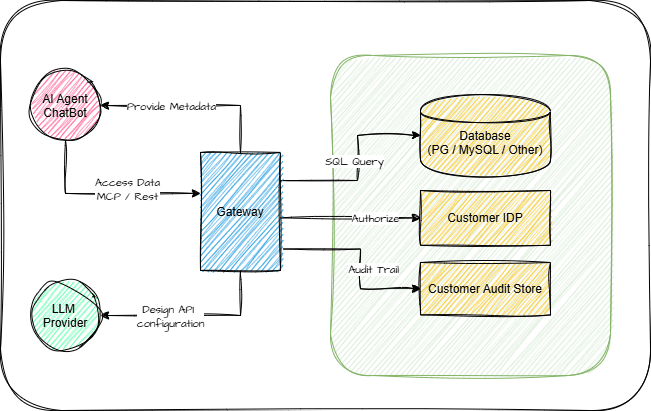Provides integration with ClickHouse databases, automatically generating APIs optimized for analytical workloads and high-performance queries.
Provides Docker container deployment options for easy setup and consistent runtime environments.
Provides integration with ElasticSearch, enabling AI agents to query and search through data via automatically generated APIs.
Offers interactive demos via GitHub Codespaces for quick testing and exploration of the Gateway capabilities.
Supports Google Gemini models for API generation, with a free tier option for development and testing purposes.
Supports deployment on Kubernetes using the provided Helm chart for scalable and managed API deployments.
Integrates with LangChain, enabling the use of Gateway's auto-generated APIs within LangChain applications and workflows.
Connects to MySQL databases, generates optimized APIs based on schema analysis, and provides access to data with built-in security features.
Supports OpenAI models for API generation, enabling the use of OpenAI's language models during the API configuration discovery process.
Integrates with OpenTelemetry for comprehensive monitoring, request tracking, and audit trails of API usage.
Connects to PostgreSQL databases, automatically generates APIs from table schemas, and provides secure access to data with support for complex queries.
Connects to Snowflake data warehouses, generating APIs that enable secure access to data with built-in PII protection and optimized queries.
Supports SQLite databases, generating REST and MCP interfaces with automatic API documentation and security features.
Provides a Telegram community channel for support and updates.
Click on "Install Server".
Wait a few minutes for the server to deploy. Once ready, it will show a "Started" state.
In the chat, type
@followed by the MCP server name and your instructions, e.g., "@CentralMind/Gatewayshow me the top 10 customers by total sales this month"
That's it! The server will respond to your query, and you can continue using it as needed.
Here is a step-by-step guide with screenshots.
🚀 Interactive Demo avialable here: https://centralmind.ai
What is Centralmind/Gateway
Simple way to expose your database to AI-Agent via MCP or OpenAPI 3.1 protocols.
This will run for you an API:
Which you can use inside your AI Agent:

Gateway will generate AI optimized API.
Related MCP server: Database Tools for Claude AI
Why Centralmind/Gateway
AI agents and LLM-powered applications need fast, secure access to data. We're building an API layer that automatically generates secure, LLM-optimized APIs for your structured data.
Quickly start with MCP or OpenAPI, or use Direct/Raw SQL APIs
Filters out PII and sensitive data to ensure compliance with GDPR, CPRA, SOC 2, and other regulations
Adds traceability and auditing capabilities, ensuring AI applications aren't black boxes and allowing security teams to maintain control
Optimized for AI workloads: supports the Model Context Protocol (MCP) with enhanced metadata to help AI agents understand APIs, along with built-in caching and security features
It can be useful during development, when an LLM needs to create, adjust, or query data from your database. In analytical scenarios, it enables you to chat with your database or data warehouse. Enrich your AI agents with data from your database using remote function/tool calling.

Features
⚡ Automatic API Generation – Creates APIs automatically using LLM based on table schema and sampled data
🗄️ Structured Database Support – Supports PostgreSQL, MySQL, ClickHouse, Snowflake, MSSQL, BigQuery, Oracle Database, SQLite, ElasticSearch
🌍 Multiple Protocol Support – Provides APIs as REST or MCP Server including SSE mode
🔐 Authentication Options – Built-in support for API keys and OAuth
🔒 PII Protection – Implements regex plugin or Microsoft Presidio plugin for PII and sensitive data redaction
👀 Comprehensive Monitoring – Integration with OpenTelemetry (OTel) for request tracking and audit trails
📦 Local & On-Premises – Support for self-hosted LLMs through configurable AI endpoints and models
🤖 Multiple AI Providers Support - Support for OpenAI, Anthropic, Amazon Bedrock, Google Gemini & Google VertexAI
⚡ Flexible Configuration – Easily extensible via YAML configuration and plugin system
📜 API Documentation – Auto-generated Swagger documentation and OpenAPI 3.1.0 specification
🔑 Row-Level Security (RLS) – Fine-grained data access control using Lua scripts
🏎️ Performance Optimization – Implements time-based and LRU caching strategies
How it Works

1. Connect & Discover
Gateway connects to your structured databases like PostgreSQL and automatically analyzes the schema and data samples to generate an optimized API structure based on your prompt. LLM is used only on discovery stage to produce API configuration. The tool uses AI Providers to generate the API configuration while ensuring security through PII detection.
2. Deploy
Gateway supports multiple deployment options from standalone binary, docker or Kubernetes. Check our launching guide for detailed instructions. The system uses YAML configuration and plugins for easy customization.
3. Use & Integrate
Access your data through REST APIs or Model Context Protocol (MCP) with built-in security features. Gateway seamlessly integrates with AI models and applications like LangChain, OpenAI and Claude Desktop using function calling or Cursor through MCP. You can also setup telemetry to local or remote destination in otel format.
Documentation
Getting Started
Quickstart Guide
Installation Instructions
API Generation Guide
API Launch Guide
Additional Resources
ChatGPT Integration Guide
Database Connector Documentation
Plugin Documentation
How to Build
API Generation
Gateway uses LLM models to generate your API configuration. Follow these steps:
Choose one of our supported AI providers:
OpenAI and all OpenAI-compatible providers
Google Gemini provides a generous free tier. You can obtain an API key by visiting Google AI Studio:
Once logged in, you can create an API key in the API section of AI Studio. The free tier includes a generous monthly token allocation, making it accessible for development and testing purposes.
Configure AI provider authorization. For Google Gemini, set an API key.
Run the discovery command:
Enjoy the generation process:
Review the generated configuration in
gateway.yaml:
Running the API
Run locally
Docker Compose
MCP Protocol Integration
Gateway implements the MCP protocol for seamless integration with Claude and other tools. For detailed setup instructions, see our Claude integration guide.
To add MCP Tool to Claude Desktop just adjust Claude's config :
Roadmap
It is always subject to change, and the roadmap will highly depend on user feedback. At this moment, we are planning the following features:
Database and Connectivity
🗄️ Extended Database Integrations - Databricks, Redshift, S3 (Iceberg and Parquet), Oracle DB, Microsoft SQL Server, Elasticsearch
🔑 SSH tunneling - ability to use jumphost or ssh bastion to tunnel connections
Enhanced Functionality
🔍 Advanced Query Capabilities - Complex filtering syntax and Aggregation functions as parameters
🔐 Enhanced MCP Security - API key and OAuth authentication
Platform Improvements
📦 Schema Management - Automated schema evolution and API versioning
🚦 Advanced Traffic Management - Intelligent rate limiting, Request throttling
✍️ Write Operations Support - Insert, Update operations
Database Gateway in MCP Registries
https://mcpreview.com/mcp-servers/centralmind/gateway
https://mcp.so/server/gateway/centralmind
https://smithery.ai/server/@centralmind/gateway
https://www.pulsemcp.com/servers/centralmind-database-gateway
Appeared in Searches
- Connecting Cursor to Oracle Database for Data Learning
- MCP server for PostgreSQL and MySQL database indexing and DDL queries
- System capable of integrating with ERP and other information system databases
- Google BigQuery cloud data warehouse service
- Connecting to Oracle DB and summarizing table details with schema, relationships, and associated components